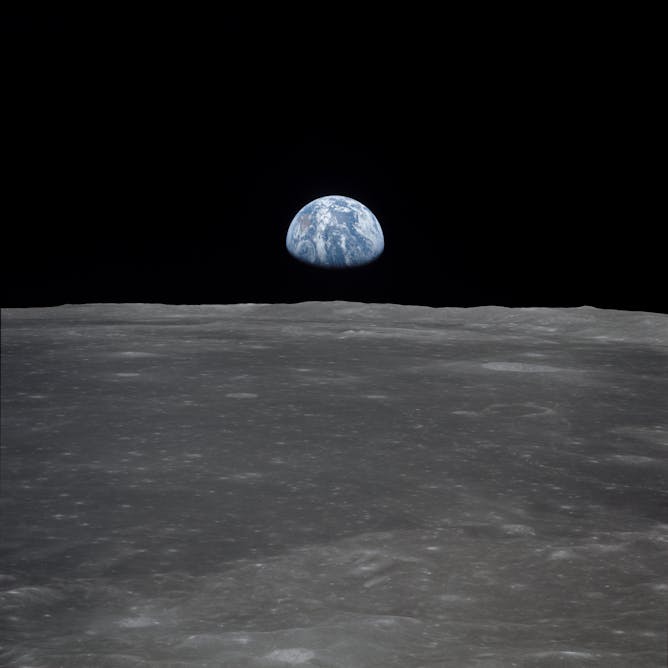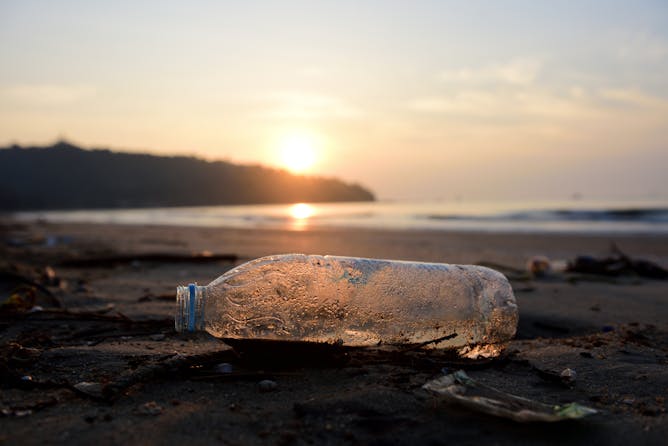|
|
|
|
The water detected on the Moon over the past couple of decades is absolutely central to building a human base there. By extracting water from rocks and dust, astronauts could produce breathable air and rocket fuel. But it is still not very clear what type of water it is, and how and where it would best be extracted.
The term water isn’t just used for molecular water, but also for mixes of hydrogen and hydroxyl. Although the latter two could be combined by astronauts to form molecular water at the lunar surface, it is important to know in what forms of water are present. For example, molecular water in the form of water ice would be easier to extract than hydroxyl locked in rocks.
Now two new studies, published in Nature Astronomy, have strengthened the case for exploring the Moon by demonstrating that there is indeed water ice there – and that water supplies are likely more abundant than previously thought.
Meanwhile, little has changed when it comes to stereotyping people based on their accents in England, where the standard higher-class accent – “received pronunciation” – is consistently rated as more intelligent than others. And it turns out the war against plastic may be overshadowing greater threats to the environment.
|
Miriam Frankel
Science Editor
|

|
|

NASA JSC.
James Mortimer, The Open University; Mahesh Anand, The Open University
Two new studies significantly advance our understanding of water on the Moon and where to find it.
|

It’s not just Northern accents that face discrimination. The Essex accent is also the source of stigma.
pxl.store/Shutterstock
Monika Schmid, University of Essex; Amanda Cole, University of Essex; Ella Jeffries, University of Essex
Stereotyping people based on their accents is still a big problem at universities in England.
|

FocusDzign / shutterstock
Thomas Stanton, Nottingham Trent University; Matthew Johnson, University of Nottingham; Paul Kay, University of Leeds
We need to focus on causes like overconsumption, not the material itself.
|
Politics + Society
|
-
Ursula F Ott, Nottingham Trent University; Pervez N Ghauri, University of Birmingham
The big losers from such a scenario would not be the countries of the European Union.
-
Jennifer M. Piscopo, Occidental College; Peter Siavelis, Wake Forest University
After a year of unrest Chileans voted decisively on Oct. 25 to replace their constitution, a relic of the military dictator Pinochet. Civilians, half of them women, will write the new constitution.
-
Sydney Calkin, Queen Mary University of London
The ruling will not end the demand for abortion. It will instead accelerate the trends for abortion travel abroad and self-managed abortion with pills.
-
Gwyn McClelland, University of New England
The hibakusha (survivors) of the 1945 bombings have been among the most tireless campaigners for the treaty. The Japanese government, however, has not supported it.
-
Olamide Samuel, SOAS, University of London
The International Criminal Court has been called to investigate the shooting of unarmed protesters in Lagos.
|
|
Environment + Energy
|
-
Jonathan Bamber, University of Bristol
The Laptev Sea is one of the Arctic's biggest nurseries of new sea ice in winter, but Siberia's record summer heat may have halted production.
-
Susannah Scott, University of California Santa Barbara
Plastic waste is a global problem. Now a chemist has developed a new strategy for breaking down the most common plastic so it can be not just recycled, but upcycled into desirable goods.
|
|
Health + Medicine
|
-
Rajesh Khanna, University of Arizona; Aubin Moutal, University of Arizona
Scientists in the UK and Germany discovered a new doorway that the COVID-19 virus uses to infect human cells. This reveals new therapeutic possibilities for blocking the virus.
|
|
Arts + Culture
|
-
Laura Varnam, University of Oxford
It's a very modern version which gives the female characters more agency than in previous adaptations.
|
|
Cities
|
-
Jill L Edmondson, University of Sheffield
Between the 1950s and the present day, there has been a 65% reduction in allotment land in the UK.
|
|
| |
Featured events
|

|
Swansea University , Singleton Park, Swansea, Swansea [Abertawe GB-ATA], SA3 3DX, United Kingdom of Great Britain and Northern Ireland — Swansea University
|

|
Online, Online, Oxfordshire, OX13BD, United Kingdom of Great Britain and Northern Ireland — University of Oxford
|

|
East Road, Cambridge, Cambridgeshire, CB11PT, United Kingdom of Great Britain and Northern Ireland — Anglia Ruskin University
|

|
Sustainable Places Research Institute, Cardiff University, Cardiff, Cardiff [Caerdydd GB-CRD], CF10 3BA, United Kingdom of Great Britain and Northern Ireland — Cardiff University
|
|
|
|
| |
| |
| |
| |
| |
|
|
|
|
|
|
|